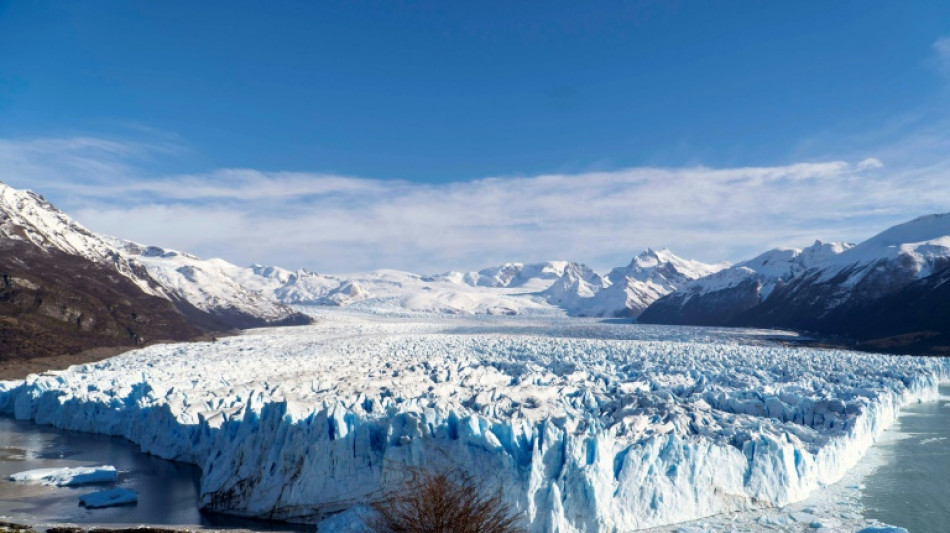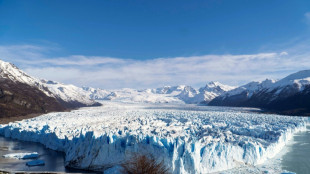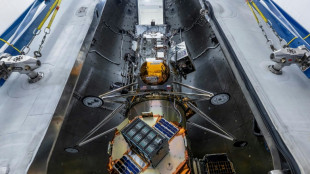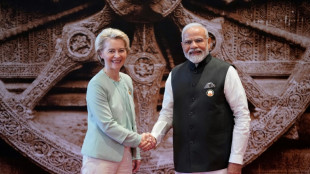
-
 Worry, confusion as Vietnam slashes public jobs
Worry, confusion as Vietnam slashes public jobs
-
Asian markets tumble as Trump tariff salvo fans fresh fears

-
 China's leaders gather to hash out Trump tariff battle plans
China's leaders gather to hash out Trump tariff battle plans
-
'Anora' vs 'Conclave'? Oscars set for 'nail-biter' showdown

-
 'With Love, Meghan': what's behind Markle's new rebranding?
'With Love, Meghan': what's behind Markle's new rebranding?
-
Trading halted in troubled Australian casino firm

-
 Global stocks mostly fall on Nvidia results, fresh Trump tariff talk
Global stocks mostly fall on Nvidia results, fresh Trump tariff talk
-
Trump says US, Britain working on 'great' trade deal

-
 Apple accused of greenwashing in US lawsuit
Apple accused of greenwashing in US lawsuit
-
Meta fires employees for leaks amid Zuckerberg's Trump pivot

-
 Study reveals how Earth's orbit controls ice ages
Study reveals how Earth's orbit controls ice ages
-
Trump tariffs: What's been done and what is to come?

-
 UN nature talks 'close' to breaking funding deadlock
UN nature talks 'close' to breaking funding deadlock
-
Mexican president hopes to talk with Trump to avoid tariffs

-
 The risks of Trump tariffs encapsulated in a car key
The risks of Trump tariffs encapsulated in a car key
-
Trump says China to face added 10% tariff starting in March

-
 Toronto Pride says sponsors bolting over Trump's anti-DEI push
Toronto Pride says sponsors bolting over Trump's anti-DEI push
-
In major shift, Ocalan calls for PKK to drop weapons, disband

-
 Baby, you're a firework! Katy Perry to blast off into space
Baby, you're a firework! Katy Perry to blast off into space
-
European stock markets slide as Trump targets EU with tariffs

-
 Ocalan: Kurdish PKK founder who urged his fighters to disarm
Ocalan: Kurdish PKK founder who urged his fighters to disarm
-
'No need to overthink': China Tesla fans unfazed by Musk politics

-
 Audi Brussels shuts down as Europe's auto woes deepen
Audi Brussels shuts down as Europe's auto woes deepen
-
Stock markets struggle as Trump tariffs target EU

-
 Jailed PKK leader Ocalan expected to call for peace with Turkey
Jailed PKK leader Ocalan expected to call for peace with Turkey
-
EU's top team in India to bolster relations

-
 Two men publicly flogged in Indonesia for gay sex
Two men publicly flogged in Indonesia for gay sex
-
Thank you! Oscars speeches over the years

-
 The women brewing change in India, one beer at a time
The women brewing change in India, one beer at a time
-
Asian markets mixed after latest Trump tariff threat

-
 7-Eleven owner shares plunge as family buyout fails
7-Eleven owner shares plunge as family buyout fails
-
Oscar fave 'Anora,' a 'love letter' to eccentric beachside Brooklyn

-
 Hamas hands over bodies of Israelis as more Palestinian prisoners freed
Hamas hands over bodies of Israelis as more Palestinian prisoners freed
-
Private US company blasts off for second Moon landing attempt

-
 US Fed will 'adapt' to any policy changes, Chicago's Goolsbee says
US Fed will 'adapt' to any policy changes, Chicago's Goolsbee says
-
AI chip giant Nvidia reports blockbuster revenue

-
 EU was born to 'screw' US, Trump says
EU was born to 'screw' US, Trump says
-
Trump's trade envoy Jamieson Greer confirmed by lawmakers

-
 Eyeing Trump trade policy shakeup, Eli Lilly to build 4 US factories
Eyeing Trump trade policy shakeup, Eli Lilly to build 4 US factories
-
Amazon's next-gen Alexa gets AI upgrade

-
 G20 leaders say global stability threatened by declining cooperation
G20 leaders say global stability threatened by declining cooperation
-
US new home sales miss expectations in January on cold weather

-
 EU vows to slash red tape but stick to climate goals
EU vows to slash red tape but stick to climate goals
-
France court orders retrial of Chilean over alleged murder of ex-girlfriend

-
 Dreadlocks and downward dogs: Oslo's new bishop takes unorthodox approach
Dreadlocks and downward dogs: Oslo's new bishop takes unorthodox approach
-
Indonesia agrees deal with Apple that could end iPhone sales ban

-
 Global stability threatened by backslide in cooperation: S.Africa
Global stability threatened by backslide in cooperation: S.Africa
-
'Sorry I couldn't protect you': Israel mourns Bibas mother, sons

-
 BP ditches climate targets in pivot back to oil and gas
BP ditches climate targets in pivot back to oil and gas
-
EU seeks to balance business needs, climate goals


Study reveals how Earth's orbit controls ice ages
The Earth's next ice age is expected to begin in about 11,000 years -- unless human-caused global warming disrupts natural cycles.
That's according to a new study published Thursday in Science, which analyzed how subtle shifts in Earth's orbit around the Sun have historically triggered massive climate changes.
A research team examined a million-year record of climate change, focusing on land-based ice sheets across the Northern Hemisphere and deep ocean temperatures.
They then paired this data with small but cyclical variations in Earth's orbital patterns.
"For many years, the difficulty in answering how small changes in Earth's orbit around the Sun translate to large shifts between glacial and interglacial states has been a central theme in paleoclimate research," lead author Stephen Barker, a professor at Cardiff University, told AFP.
Earth has long alternated between ice ages and warmer interglacial periods, with the last glaciation ending approximately 11,700 years ago. This transition marked the beginning of the Holocene epoch, an era of relative climate stability that enabled early human societies to shift from nomadic hunting and gathering to settled agriculture.
Scientists have long recognized a connection between Earth's orbit and ice ages. However, due to challenges in accurately dating climate changes that occurred so far in the past, they struggled to pinpoint which orbital parameters were responsible for starting and ending these glacial cycles.
According to Barker, the key breakthrough came from analyzing the "shape" of the ancient climate record -- the curves showing how temperatures rose and fell over time -- rather than just the timing of ice age transitions.
This approach allowed the team to determine how the three orbital factors -- tilt, wobble, and the shape of Earth's orbit around the Sun -- interact to drive ice age cycles over the past 900,000 years.
Barker said that without the Industrial Revolution, assuming fossil fuels had never been burned, "we would expect a glaciation to occur within the next 11,000 years, and it would end in 66,000 years' time."
Co-author Lorraine Lisiecki, a professor at the University of California, Santa Barbara, emphasized the significance of the study, stating that it "confirms the natural climate change cycles we observe on Earth over tens of thousands of years are largely predictable and not random or chaotic."
However, Barker strongly cautioned against interpreting the findings to suggest that human-caused climate change is beneficial.
Carbon dioxide levels have nearly doubled since the Industrial Revolution, and if emissions remain unchecked, "then in around 8,000 years' time, Antarctica would have melted, leading to around 70 meters of sea-level rise," said Barker.
"Instead of there being glaciers, you'll be underwater," he warned.
Looking ahead, the research team aims to expand on their findings by investigating the long-term impact of human-driven climate change and how it may reshape the planet's natural climate cycles.
H.Meyer--CPN

